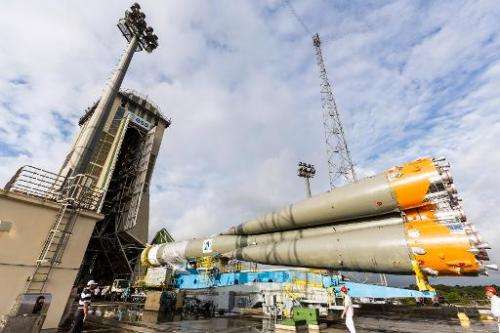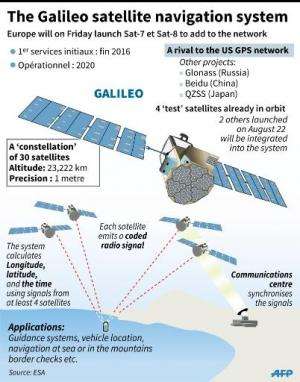A Soyuz rocket is moved from its assembly building to its launch pad at the Guiana Space Centre in Kourou, French Guiana, on March 24, 2015, where the rocket will be launched to carry two satellites to Europe's Galileo navigation system
Europe is all set to launch the seventh and eighth satellites for its navigation constellation that will ultimately consist of 30 orbiters, operators said on Wednesday.
The pair have been readied for the overnight Friday launch aboard a Soyuz rocket, said a European Space Agency (ESA) statement.
It will be the first addition to the Galileo satnav programme since a rocket mislaunch last August sent two satellites astray.
ESA's Galileo is being developed as a rival to America's GPS for navigation and search-and-rescue capabilities.
"Everything is ready for the launch," ESA's Galileo programme manager Didier Faivre told AFP. "The preparations went without a hitch."
The new orbiters are to be launched to an altitude of 22,522 kilometres (13,994 miles).
"The satellites themselves will then gradually lower themselves to their working 22,322 km orbit," said ESA.
The satellites should become operational by mid-year after in-orbit testing.
Liftoff is scheduled for 6:46:18 pm local time (2146 GMT) from Europe's spaceport in Kourou, French Guyana.
The launch had originally been set for late last year, but was suspended pending a probe into what caused the mislaunch which left satellites five and six in an incorrect, elliptical orbit.
The cause of the problem, frozen fuel pipes aboard the Russian Soyuz rocket's fourth stage, has been fixed, said ESA.
Illustrated fact file on Europe's Galileo satellite navigation system.
The fifth and sixth satellites have since been manoeuvred into a better, more circular orbit, but it was not yet clear whether they will be useful for the satnav system.
The multi-billion-euro project has encountered a long series of technical hitches, delays and budget questions. It is meant to be fully operational by 2020.
© 2015 AFP























